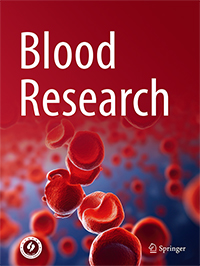Case Report
Korean J Hematol 2006; 41(1):
Published online March 30, 2006
https://doi.org/10.5045/kjh.2006.41.1.56
© The Korean Society of Hematology
1번 염색체 장완의 Triplication을 가진 골수형성이상증후군
조희순, 김민경, 현명수
영남대학 의과대학 내과학
Triplication of 1q in a Patient with Myelodysplastic Syndrome
Triplication of 1q is a very rare chromosomal abnormality in hematologic malignancies, and it has been related to Fanconi anemia. The clinical significance of this abnormality is unknown. We report here on a 55-year-old female patient who had myelodysplastic syndrome (refractory anemia with excess blasts) with triplication of 1q and trisomy 8 as the clonal cytogenetic abnormalities, as determined by bone marrow cytogenetic analysis. However, there were no clinical manifestations of Fanconi anemia or any chromosomal instability according to the peripheral blood chromosomal breakage testing. The patient developed early gastric carcinoma (poorly differentiated adenocarcinoma with a signet ring cell component) eight months later. She continuously had pancytopenia with dysplastic features, but this showed no evidence of evolving to leukemia or any relapse of the gastric carcinoma over a 2 year follow up.
Keywords Triplication of 1q, Myelodysplastic syndrome, Fanconi anemia
Article
Case Report
Korean J Hematol 2006; 41(1): 56-60
Published online March 30, 2006 https://doi.org/10.5045/kjh.2006.41.1.56
Copyright © The Korean Society of Hematology.
1번 염색체 장완의 Triplication을 가진 골수형성이상증후군
조희순, 김민경, 현명수
영남대학 의과대학 내과학
Triplication of 1q in a Patient with Myelodysplastic Syndrome
Hee Soon Cho, Min, Kyoung Kim, Myung Soo Hyun
Departments of, Laboratory Medicine and, Internal Medicine, Yeungnam University College of Medicine, Daegu, Korea
Abstract
Triplication of 1q is a very rare chromosomal abnormality in hematologic malignancies, and it has been related to Fanconi anemia. The clinical significance of this abnormality is unknown. We report here on a 55-year-old female patient who had myelodysplastic syndrome (refractory anemia with excess blasts) with triplication of 1q and trisomy 8 as the clonal cytogenetic abnormalities, as determined by bone marrow cytogenetic analysis. However, there were no clinical manifestations of Fanconi anemia or any chromosomal instability according to the peripheral blood chromosomal breakage testing. The patient developed early gastric carcinoma (poorly differentiated adenocarcinoma with a signet ring cell component) eight months later. She continuously had pancytopenia with dysplastic features, but this showed no evidence of evolving to leukemia or any relapse of the gastric carcinoma over a 2 year follow up.
Keywords: Triplication of 1q, Myelodysplastic syndrome, Fanconi anemia

Article Tools
Stats or Metrics
Related articles in BR
-
Genetics and genomics of bone marrow failure syndrome
Hyun-Young Kim, Hee-Jin Kim, Sun-Hee Kim
Blood Res 2022; 57(S1): S86-S92 -
Lenalidomide for anemia correction in lower-risk del(5q) myelodysplastic syndrome patients of Asian ethnicity
Junshik Hong, Yoo Jin Lee, Sung Hwa Bae, Jun Ho Yi, Sungwoo Park, Myung Hee Chang, Young Hoon Park, Shin Young Hyun, Joo-Seop Chung, Ji Eun Jang, Joo Young Jung, So-Yeon Jeon, Seo-Young Song, Hawk Kim, Dae Sik Kim, Sung-Hyun Kim, Min Kyoung Kim, Sang Hoon Han, Seonyang Park, Yoo-Jin Kim, Je-Hwan Lee, on behalf of the AML/MDS Working Party of the Korean Society of Hematology
Blood Res 2021; 56(2): 102-108 -
Myelodysplastic syndrome with genetic predisposition
Meerim Park
Blood Res 2021; 56(S1): S34-S38




 PDF
PDF Standard view
Standard view Export citation
Export citation Share
Share  Previous Article
Previous Article



